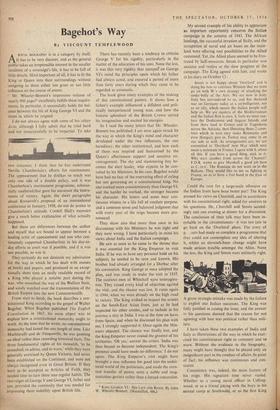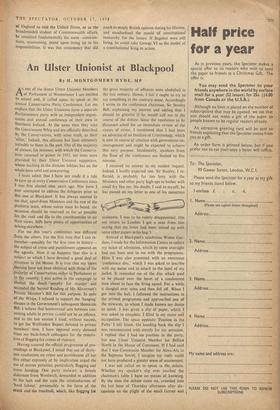Bagehot's Way
By VISCOUNT
TEMPLEWOOD
AROYAL BIOGRAPHY is in a category by itself. It has to be very discreet, and as the general public takes an irrepressible interest in the smaller incidents of a sovereign's life, it has to be full of little details. Most important of all, it has to fit the King or Queen into their surroundings without assigning to them either too great or too little influence on the course of events.
' Mr. Wheeler-Bennett's impressive volume of nearly 900 pages* excellently fulfills these require- ments. In particular, it successfully holds the bal- ance between the life of King George VI and the times in which he reigned.
I do not always agree with some of his obiter dicta, although I fully admit that he tried hard and not unsuccessfully to be impartial. To take two instances, I think that he has underrated Neville Chamberlain's efforts for rearmament.
The appeasement that he dislikes so much was only one side .of a double policy, and it was Chamberlain's rearmament programme, substan- tially unaltered,that gave his successor the instru- ments of victory. Again, the short paragraphs about Roosevelt's proposal of an international conference in January, 1938, do not do justice to Chamberlain's attitude. Cordell Hull's memoirs give a much better explanation of what actually happened.
But these are differences between the author and myself that are bound to appear between a leading critic of appeasement and one who con- tinuously supported Chamberlain in .his day-to- ' day efforts to avert war if possible, and if it was not possible, to win it: They certainly do not diminish my admiration for the way in which he has dealt with masses of books and papers, and produced in an excep- tionally short time an easily readable record of a King who played a notable part during the war, who smoothed the way of the Welfare Stale, and wisely watched over the transmutation of the British Empire into the new Commonwealth.
From start to finish, the book describes a con- stitutional King according to the gospel of Walter Bagehot. When Bagehot published The English Constitution in 1867, his main object was to explain how a constitutional monarchy ought to work. At the time that he wrote, no constitutional monarchy had lasted for any length of time. Like Machiavelli and de Tocqueville, he was painting an ideal rather than recording historical facts. The three fundamental rights of his monarch, 'to be consulted, to advise, and to warn,' while they were generally exercised by. Queen Victoria, had never been established on the Continent, and were not always recognised even in Great Britain. If they Were to be accepted as Articles of Faith, they needed time to turn them into regular habits. The two reigns of George V and George Vl, father and son, provided the continuity that was needed for impressing them indelibly upon British life. There has recently been a tendency to criticise George V for his rigidity, particularly in the matter of the education of his sons. None the less, it was.this very rigidity that stamped-on George VI's mind the principles upon which his father had always acted, and ensured a period of more than forty years during which they came to be regarded as axiomatic.
The book gives many examples of the making of this constitutional pattern. It shows how a father's example influenced a diffident and poli- tically inexperienced young man, and how the historic splendour of the British Crown stirred his imagination and excited his energies.
As I read the many letters that Mr. Wheeler- Bennett has published, I am once again struck by the way in which the King's mind and character developed under the two influences, the one hereditary, the other institutional, and how each of them was inspired and humanised by the Queen's affectionate support and sensitive en- couragement. The shy and stammering boy be- comes the alert leader, who expects to be con- sulted by his Ministers. In his case, Bagehot would have had no fear of the enervating effect of ruling but not governing on a constitutional king. No one worked more conscientiously than George VI, and the harder he worked, the stronger became his character. His letters and notes bear con- tinuous witness to a 'life full of resolute purpose, and a common sense and balanced judgment that with every year of the reign became more pro- nounced.
They show also that more than once in his discussions with his Ministers he was right and they were wrong. J have particularly in mind his views about India and the Italian campaign.
He saw as soon as he came to the throne that it was essential for the King Emperor to visit. India. If he was to have any personal hold on his subjects, he needed to be. seen and known. His brother had already arranged for ..a Durbar after his coronation. King George at once adopted the plan, and was ready to make the visit in '1937, The cautious men of Whitehall were unimagina- tive. They raised every kind of objection against the visit, and the chance was lost. It came again in 1944, when we were already on the high road to victory. The King wished to inspect the armies on the South-East Asian front, just as he had inspected his other armies, and to include• in his journey a stay in India. I was at the time on leave from Spain, and when he discussed his plan with me, I strongly supported'it. Once again the Min- isters objected. The chance was filially lost, and the King Emperor never visited the greatest of his territories. 'Oh yes,' answer the critics. 'India was then bound to become independent. The King's presence could have made no difference.' I do not agree. The King Emperor's visit might have brought a new influence for good into the embit- tered world of the politicians, and made the even- tual transfer of power seem a noble and mag- nanimous gesture rather than a forced concession.
* KING GEORGE VI: His LIP P: AND REIGN. By John W. Wheeler-Bennett. (Macmillan, 60s.) My second example of his ability to appreciate an important opportunity concerns the Italian campaign in the autumn of 1943. The African landings, the successful invasion of Sicily, and the occupation of naval and air bases on the main- land were offering vast possibilities to the Allied command. Yet, the Allied plans seemed to be frus- trated by half-measures. Smuts in particular was anxious and restive at the slow progress of the campaign. The King agreed with him, and wrote in his diary on October 13 : Smuts is not happy about 'Overlord' and is doing his best to convince Winston that we must go on with W.'s own strategy of attacking the under-belly of the Axis. We are now in ,Italy Italy has surrendered to us, and has declared war on Germany today as a co-belligerent, not as an ally, which means the Italian people will help us. We are masters of the Mediterranean and the Italian fleet is ours. S. feels we must cap- ture the Dodecanese and Aegean Islands and from there land in Greece and in Yugoslavia across the Adriatic, thus liberating those 2 coun- tries which in turn may make Roumania and even Hungary give in. Turkey may come in on our side as well. As arrangements are, we are committed to `Overlord' next May which may mean a stalemate in France. I agree with S. about all this. If you have a good thing, stick to it. Why start another front across the Channel? F.D.R. wants to give Marshall a good job here as C.-in-C. The Russians do not want us in the Balkans. They would like to see us fighting in France, so as to have a free hand in the East of Europe.
Could the case for a large-scale offensive on the Italian front have been better put? The King pressed his views on Churchill, and in accordance with his constitutional right, asked for answers to his questions. He, Churchill and Smuts accord- ingly met one evening at dinner for a discussion. The conclusion of their talk may have been in- eyitable in the circumstances—it was too late to go back on the 'Overlord' plans. The army of p.. .ners had made so complete a programme that they could not contemplate any idea of altering it, whilst an eleventh-hour change might have made serious trouble amongst the Allies. None the less, the King and Smuts were militarily right.
A grave strategic mistake was made by the failure to exploit our Italian successes. The King was fully justified in raising the issue, and the answer to his questions showed that the reason for not agreeing with him was political rather than mili- tary.
I• have taken •these two examples of India and Italy as illustrations of the way in which he exer- cised his constitutional right to comment and to warn. Without the evidence in the biography, many might have thought that he played only an insignificant part in the conduct of affairs. In point of Tact, his influence was continuous and con- sistent.
Consistency was, indeed, the main feature of his reign. His signature tune never• varied. Whether as a young naval officer in Coiling- wood, or as a friend joking with the boys in his annual camp at Southwold, or as the first King of England to visit the United States, or as the broadminded student of Commonwealth affairs, he remained fundamentally the same—conscien- tious, unassuming, intent upon living up to his responsibilities. It was this consistency that did much to steady British opinion during his lifetime, and standardised the -mould of constitutional monarchy for the future. If Bagehot were still living, he could take George VI as the model of a constitutional King in action.



































 Previous page
Previous page